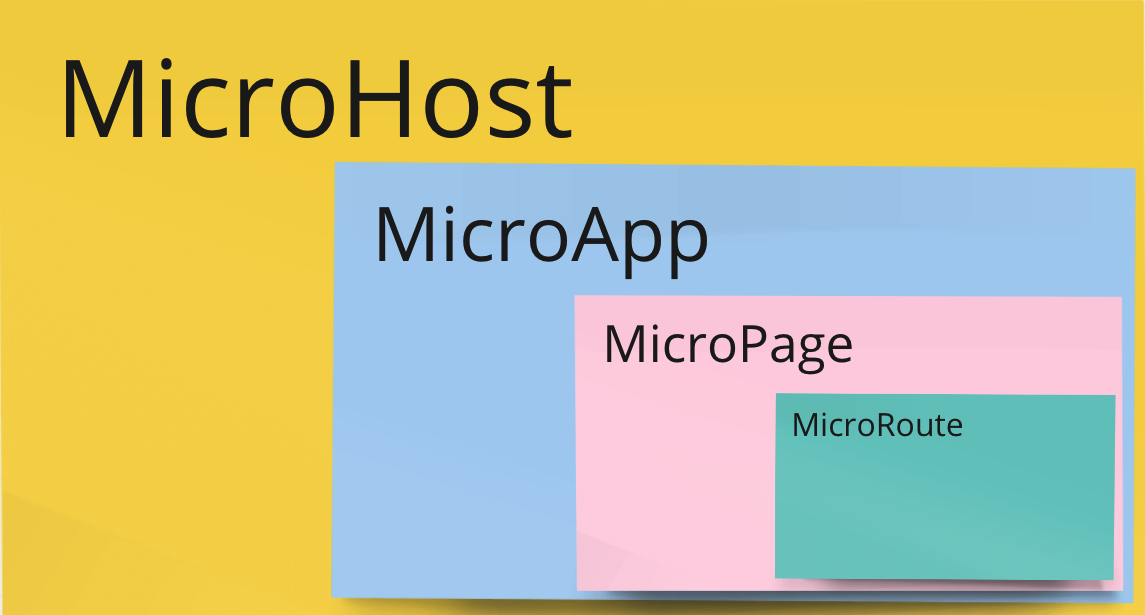flutter_micro_app 0.1.0  flutter_micro_app: ^0.1.0 copied to clipboard
flutter_micro_app: ^0.1.0 copied to clipboard
A package to speed up the creation of micro frontends structure in Flutter applications
A package to speed up the creation of micro frontend(or independent features) structure in Flutter applications (beta version) #

Navigation between pages #
Use [NavigatorInstance] to navigate between pages
NavigatorInstance.pop();
NavigatorInstance.pushNamed();
NavigatorInstance.pushNamedNative();
NavigatorInstance.pushReplacementNamed();
NavigatorInstance ...
Open native (Android/iOS) pages, in this way #
It needs native implementation, you can see an example inside android folder
// If not implemented, always return null
final isValidEmail = await NavigatorInstance.pushNamedNative<bool>(
'emailValidator',
arguments: 'validateEmail:lorem@ipsum.com'
);
print('Email is valid: $isValidEmail');
// Listen to all flutter navigation events
NavigatorInstance.eventController.flutterLoggerStream.listen((event) {
logger.d('[flutter: navigation_log] -> $event');
});
// Listen to all native (Android/iOS) navigation events (if implemented)
NavigatorInstance.eventController.nativeLoggerStream.listen((event) {});
// Listen to all native (Android/iOS) navigation requests (if implemented)
NavigatorInstance.eventController.nativeCommandStream.listen((event) {});
Define micro app configurations and contracts #
Configure the preferences (optional)
MicroAppPreferences.update(
MicroAppConfig(
nativeEventsEnabled: true, // If you want to dispatch and listen to events between native(Android/iOS) [default = false]
pathSeparator: MicroAppPathSeparator.slash // It joins the routes segments using slash "/" automatically
)
);
Register all routes #
This is just a suggestion of routing strategy (Optional) It's important that all routes are availble out of the projects, avoiding dependencies between micro apps. Create all routes inside a new package, and import it in any project as a dependency. This will make possible to open routes from anywhere in a easy and transparent way.
Create the routing package: flutter create template=package micro_routes
// Export all routes
class Application1Routes extends MicroAppRoutes {
@override
MicroAppBaseRoute get baseRoute => MicroAppBaseRoute('application1');
String get page1 => baseRoute.path('page1');
String get page2 => baseRoute.path('page2', ['segment1', 'segment2']);
}
For example, you can open a page that is inside other MicroApp, in this way:
NavigatorInstance.pushNamed(OtherMicroAppRoutes().specificPage);
NavigatorInstance.pushNamed(Application1Routes().page1);
Expose all pages throuth a contract MicroApp (Inside external projects or features folder) #
import 'package:micro_routes/exports.dart';
class Application1MicroApp extends MicroApp with Application1Routes {
@override
List<MicroAppPage> get pages => [
MicroAppPage(name: baseRoute.name, builder: (context, arguments) => const Initial()),
MicroAppPage(name: page1, builder: (context, arguments) => const Page1()),
MicroAppPage(name: page2, builder: (context, arguments) {
final page2Params.fromMap(arguments);
return Page2(params: page2Params);
}),
];
}
Initialize the host, registering all micro apps #
- MicroHost is also a MicroApp, so you can register pages here too.
- MyApp needs to extends MicroHostStatelessWidget or MicroHostStatefulWidget
- The MicroHost is the root widget, and it has all MicroApps, and the MicroApps has all Micro Pages.
void main() {
runApp(MyApp());
}
class MyApp extends MicroHostStatelessWidget {
@override
Widget build(BuildContext context) {
return MaterialApp(
title: 'Flutter Demo',
navigatorKey: NavigatorInstance.navigatorKey, // Required
onGenerateRoute: onGenerateRoute, // [onGenerateRoute] this is created automatically, so just use it, or override it, if needed.
initialRoute: baseRoute.name,
navigatorObservers: [
NavigatorInstance // Add NavigatorInstance here, if you want to get didPop, didReplace and didPush events
],
);
}
// Base route of host application
@override
MicroAppBaseRoute get baseRoute => MicroAppBaseRoute('/');
// Register all root [MicroAppPage]s here
@override
List<MicroAppPage> get pages => [
MicroAppPage(name: baseRoute.name, builder: (_, __) => const HostHomePage())
];
// Register all [MicroApp]s here
@override
List<MicroApp> get microApps => [MicroApplication1(), MicroApplication2()];
}
Handling micro apps events #
Dispatching events
// dispatching in channel "user_auth", only
MicroAppEventController()
.emit(const MicroAppEvent(
name: 'my_event',
payload: {'data': 'lorem ipsum'},
channels: ['user_auth'])
);
Listen to events (MicroApp)s
// It listen to all events
@override
MicroAppEventHandler? get microAppEventHandler =>
MicroAppEventHandler((event) => logger.d([ event.name, event.payload]));
// It listen to events with id equals 123, only!
@override
MicroAppEventHandler? get microAppEventHandler =>
MicroAppEventHandler((event) {
logger.d([ event.name, event.payload]);
}, id: '123');
// It listen to events with channels "chatbot" and "user_auth"
@override
MicroAppEventHandler? get microAppEventHandler =>
MicroAppEventHandler((event) {
// User auth feature, asked to show a popup :)
myController.showDialog(event.payload);
}, channels: ['chatbot', 'user_auth']);
Managing events
MicroAppEventController().unregisterHandler(id: '123');
MicroAppEventController().unregisterHandler(channels: ['user_auth']);
MicroAppEventController().pauseAllHandlers();
MicroAppEventController().resumeAllHandlers();
MicroAppEventController().unregisterAllHandlers();
Initiating an event subscription anywhere in the application (inside a StatefulWidget, for example) #
Using subscription
final subscription = MicroAppEventController().stream.listen((MicroAppEvent event) {
logger.d(event);
});
// later, in dispose method of the widget
@override
void dispose() {
subscription.cancel();
super.dispose();
}
Using handler
MicroAppEventController().registerHandler(MicroAppEventHandler(id: '1234'));
// later, in dispose method of the widget
@override
void dispose() {
MicroAppEventController().unregisterSubscription(id: '1234');
super.dispose();
}
Overriding onGenerateRoute method #
If it fails to get a page route, ask for native(Android/iOS) to open the page
@override
Route? onGenerateRoute(RouteSettings settings, {bool? routeNativeOnError}) {
//! If you wish native app receive requests to open routes, IN CASE there
//! is no route registered in Flutter, please set [routeNativeOnError: true]
return super.onGenerateRoute(settings, routeNativeOnError: true);
}
If it fails to get a page route, show a default error page
@override
Route? onGenerateRoute(RouteSettings settings, {bool? routeNativeOnError}) {
final pageRoute = super.onGenerateRoute(settings, routeNativeOnError: false);
if (pageRoute == null) {
// If pageRoute is null, this route wasn't registered(unavailable)
return MaterialPageRoute(
builder: (_) => Scaffold(
appBar: AppBar(),
body: const Center(
child: Text('Page Not Found'),
),
));
}
return pageRoute;
}
The following table shows how Dart values are received on the platform side and vice versa #
| Dart | Kotlin | Swift | Java |
|---|---|---|---|
| null | null | nil | null |
| bool | Boolean | NSNumber(value: Bool) | java.lang.Boolean |
| int | Int | NSNumber(value: Int32) | java.lang.Integer |
| int, if 32 bits not enough | Long | NSNumber(value: Int) | java.lang.Long |
| double | Double | NSNumber(value: Double) | java.lang.Double |
| String | String | String | java.lang.String |
| Uint8List | ByteArray | FlutterStandardTypedData(bytes: Data) | byte[] |
| Int32List | IntArray | FlutterStandardTypedData(int32: Data) | int[] |
| Int64List | LongArray | FlutterStandardTypedData(int64: Data) | long[] |
| Float32List | FloatArray | FlutterStandardTypedData(float32: Data) | float[] |
| Float64List | DoubleArray | FlutterStandardTypedData(float64: Data) | double[] |
| List | List | Array | java.util.ArrayList |
| Map | HashMap | Dictionary | java.util.HashMap |